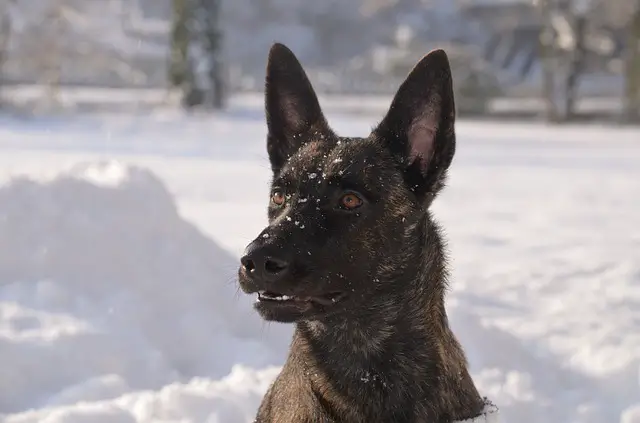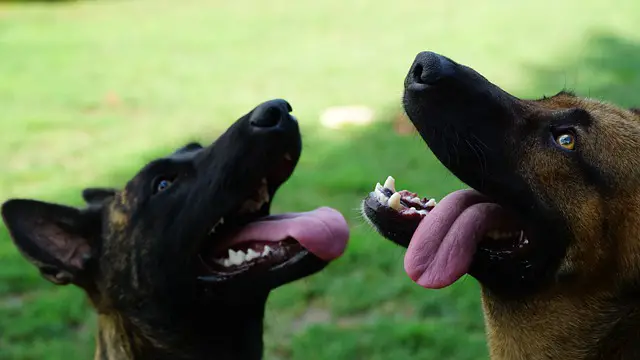The Dutch shepherd is quite a handsome but rare breed. If you see one, you may mistake it for a German Shepherd or a Belgian Malinois.
These dogs come in three varying coats, wire-haired, long-haired, and the most common, short-haired.
The brindle colors and patterns are what will catch your eye and set them apart from the German shepherd and Belgian Malinois.
The temperament of the Dutch Shepherd is an even one. They are loyal and loving with family and are very sociable with people, other dogs, and children. They are protective if need be with an intuitive sense and alertness.
The Dutch are just well-rounded dogs. They are becoming a little more well-known because the military and police have found that the Dutch Shepherd and the Belgian Malinois work diligently and tirelessly and are often preferred over the German shepherd.
Because the Dutch shepherd is a rarer breed, they are also quite a healthy breed. They have a very small occurrence of genetic diseases as many overly bred dogs do have. Still, the Dutch can develop a few health issues and allergies can be one of them. Yes, dogs can suffer from allergies just as we humans do.
Your Dutch shepherd can develop allergies, but can you develop allergies from your Dutch shepherd? In the following post,
I will give you information on Dutch shepherd allergies and I will answer the question, “are Dutch shepherds hypoallergenic? Also included will be information on how to deal with Dutch shepherd allergies.

For your dog’s vitamin supplement, dog food, dog toys, or other dogs product please visit the Health Extension website
Are Dutch Shepherds Hypoallergenic?
Dutch shepherds are very intelligent, energetic, loyal, and friendly and make wonderful family pets. If someone in your family is allergic to dogs, then things may not be so wonderful with the Dutch shepherd. These dogs are not hypoallergenic and actually, there are no “hypoallergenic” dogs.
The Dutch shepherd comes in three different coats, rough-haired, long-haired, and short-haired and these are all double coats.
This means that they have a dense, wooly undercoat and a water-repellent topcoat. When dogs have a double coat, they shed some all year but more intensely in spring and fall.
This is bad news for allergy sufferers, not necessarily because of all of the shed fur. Dander, which is dead skin, is the real culprit in allergies, but unfortunately, when fur is shed, dander comes along for the ride!
If you do have dog allergies, a dog that sheds less may be the answer, If you have your heart set on a Dutch shepherd and you have allergies that aren’t too severe, perhaps allergy medication can be the answer.
To check your Dutch shepherd’s health status or their DNA, please visit the Embark vet website for all the help you may need.
Dutch Shepherd Allergy Information
Dutch shepherds can suffer from allergies, just as some of us do. Below are various allergies that can give your Dutch shepherd a reaction.
Environmental Allergies
Your Dutch shepherd can be plagued by seasonal allergies and these may be easy to identify because they occur at certain times of the year. They can be allergic to plants, grasses, ragweed, etc. Symptoms can be:
- Sneezing.
- Coughing.
- Watery Eyes.
- Runny Nose.
- Hot Spots.
- Itchy, Inflamed Skin.
- Atopic Dermatitis.
- Hair Loss.

Indoor Allergies
Dutch shepherds can have allergies to dust, dust mites, mold, scented candles, cleaning products, etc. Symptoms are:
- Sneezing.
- Watery Eyes.
- Runny Nose.
- Coughing.
Flea Allergies
This is a very common allergy in dogs. Dogs develop flea allergy dermatitis from flea bites. When fleas bite your Dutch shepherd, saliva is released, containing proteins that are allergenic to most dogs.
This causes severely itchy skin, which leads to scratching and can develop into a skin infection.
Food Allergies
Just as people can be allergic to foods, so can dogs. Usually, though, dogs are allergic to any ingredient in their food and generally, it is a protein such as eggs, chicken, beef, or lamb.
Dogs rarely have an anaphylactic reaction like some people do to foods like shellfish and nuts but they can present with a whole host of symptoms such as:
- Itching.
- Scratching.
- Skin Rashes.
- Hair Loss.
- Gastrointestinal Issues – Vomiting and/or Diarrhea.
Bee Sting Allergies
Dogs can also have allergies to bee stings. These can be mild reactions or severe like:
- Stomach Issues.
- Skin Rashes.
- Hives.
- Anaphylaxis – a medical emergency that quickly occurs after a sting with hives, the airway closes, a drop in blood pressure, and shock.
Drug Allergies
Your Dutch shepherd can also develop an allergy to certain medications. Reactions can occur after the first dose or even after your pup has taken it for several days. Signs can be:
- Rashes.
- Hives.
- Trouble breathing anaphylaxis.
How To Deal With Dutch Shepherd Allergies

Below are tips to deal with the different categories of allergies that Dutch shepherds can suffer from.
treating allergies from the environment
If your Dutch shepherd develops allergies to outdoor allergens some remedies can be:
- Allergy medication.
- Omega 3 supplements.
- Oral steroids.
- Topical medication for hot spots.
- Soothing Shampoos.
- Allergy serum injections desensitize the immune system.
solutions for indoor allergies
This is considered an inhalant allergy or atopy just as outdoor allergies are because allergens are inhaled like particles of dust or chemical irritants. Some solutions are:
- Allergy Medication.
- Soothing Baths.
- Vacuuming your home often to remove allergens.
- Natural cleaning products.
flea allergy treatments
For your pup to acquire flea allergy dermatitis there need to be fleas! Your job is to rid your pup of fleas.
Prevention is the best way to avoid fleas altogether and using a flea collar, flea drops or pills is a good way to start.
If you already have a full-blown flea infestation then you need to pull out all of the big guns! Use a flea shampoo or flea dip to rid your Dutch shepherd of those nasty fleas.
You also need to wash their bedding and toys and treat your home using a flea bomb or enlisting the services of an exterminator.
treating your pup for food allergies
Gradually changing your pup’s food is the best course of treatment to help your dog be free of food allergy symptoms.
Speak with your veterinarian about how to go about that and also for types of food suggestions. There are a wide variety of dog foods available for dogs with food allergies.
bee sting allergy treatment
If your pup is stung by a bee here are some steps to take to relieve symptoms.
- Remove a stinger, if present.
- Apply an ice bag or cold compress.
- Make a paste of baking soda and water to relieve pain.
- Aloe vera gel cools and soothes.
- Oatmeal bath soothes.
- Benadryl for allergic reactions.
Watch out for signs of anaphylaxis and seek immediate treatment.
drug allergy treatment
- Stop the medication immediately at the first signs of an allergy.
- Use Benadryl for hives.
- Seek treatment immediately if there are signs of anaphylaxis.
Your Dutch shepherd may never develop any allergies, but you should be aware of the signs and symptoms nonetheless.
Sometimes it is evident, what the allergen is and other times it takes a bit of detective work, With the help of your veterinarian, together you can figure it out.
